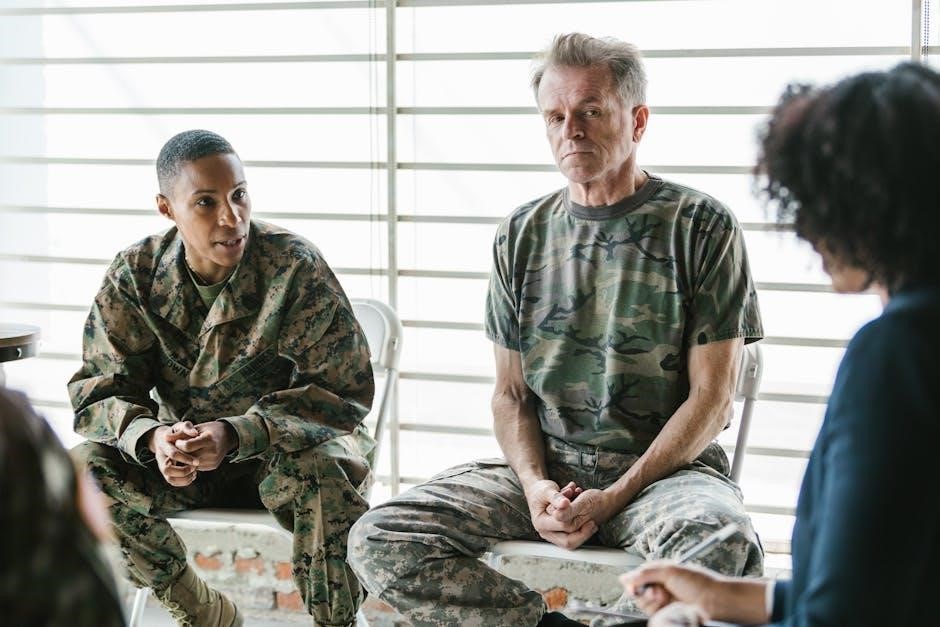Counseling chits are essential tools in the Navy for fostering growth and accountability. They provide structured feedback, helping sailors improve performance and achieve career goals effectively.
1.1 Definition and Purpose of Counseling Chits
A counseling chit is a formal document used in the Navy to communicate performance-related issues, expectations, and goals between sailors and their superiors. It serves as a corrective and developmental tool, ensuring sailors understand their responsibilities and areas for improvement. The primary purpose of a counseling chit is to document performance deficiencies, provide feedback, and outline actionable steps for growth. It also helps sailors align their actions with Navy standards, fostering accountability and professionalism. By addressing both positive and negative behaviors, counseling chits play a crucial role in personal and professional development within the naval service.
1.2 Historical Context of Counseling Chits in the Navy
Counseling chits have a long-standing history in the Navy, dating back to the need for structured communication between sailors and their superiors. Initially, they were simple forms used to document performance issues and corrective actions. Over time, their format and purpose evolved to include both positive feedback and developmental goals, reflecting the Navy’s growing emphasis on mentorship and professional growth. Despite recent transitions to digital systems like FLTMPS, the foundational role of counseling chits remains unchanged, serving as a vital tool for maintaining discipline and fostering improvement within the naval ranks.
The Structure of a Counseling Chit
A counseling chit includes the date, sailor’s name, rank, unit, description of issues, corrective actions, and signatures. It documents performance concerns and expectations clearly and concisely.
2.1 Essential Components of a Counseling Chit
A counseling chit must include the sailor’s personal information, a detailed description of the issue, specific expectations for improvement, and a section for signatures. It provides clear documentation of the counseling session, ensuring both the sailor and supervisor understand the discussed matters. This structured format helps maintain consistency and professionalism in addressing performance or behavioral concerns within the Navy.
2.2 Format and Layout Requirements
A counseling chit must adhere to a standardized format, ensuring clarity and professionalism. It typically includes sections for the sailor’s personal information, a description of the issue, expected improvements, and signatures. The layout should be clean, with proper spacing and legible fonts. Margins and headings must comply with Navy guidelines to maintain consistency. Each section should be clearly labeled to avoid confusion. The document may span multiple pages if necessary, with page numbers included for organization. Compliance with these formatting requirements ensures the chit is official and easily understood by all parties involved.

The Role of Counseling in Navy Instruction
Counseling plays a vital role in Navy instruction by fostering personal and professional growth, addressing performance issues, and ensuring sailors meet expectations for advancement and duty readiness.
3.1 Counseling as a Tool for Performance Improvement
Counseling chits serve as a cornerstone for enhancing sailor performance by identifying areas of improvement and establishing clear, actionable goals. They provide constructive feedback, fostering personal and professional development. Through structured sessions, sailors gain clarity on expectations, enabling them to address shortcomings and build skills. This collaborative process not only corrects deficiencies but also encourages growth, ensuring sailors meet operational and career advancement standards. Regular documentation of progress reinforces accountability and provides a roadmap for sustained improvement, ultimately strengthening individual and unit effectiveness within the Navy.
3.2 The Importance of Documentation in Counseling
Documentation is crucial in Navy counseling as it ensures accountability and maintains a formal record of interactions. It provides a clear, consistent history of discussions, goals, and progress, serving as a legal and administrative reference. Proper documentation protects both sailors and counselors by offering transparency and traceability. It also aids in identifying patterns, facilitating follow-up actions, and supporting sailors in achieving developmental milestones. Accurate records ensure that counseling efforts are aligned with operational and career objectives, ultimately contributing to individual and unit success within the Navy’s structured framework.

Legal and Administrative Considerations
Counseling chits must comply with legal standards, ensuring privacy and procedural fairness. They are administrative tools that formalize corrective actions, maintaining accountability while safeguarding sailors’ rights.
4.1 Legal Implications of Counseling Chits
Counseling chits carry legal significance as formal documents used in disciplinary and developmental processes. They must adhere to federal and military regulations, ensuring procedural fairness and privacy. Sailors’ rights, including confidentiality, must be respected. Improper handling or inaccurate documentation can lead to legal disputes or challenges. Commanders must ensure all actions are lawful and align with Navy policies. Counseling chits serve as evidence in administrative proceedings, making their accuracy and adherence to legal standards critical to maintaining accountability and justice within the military framework.
4.2 Privacy and Confidentiality in Counseling
Privacy and confidentiality are paramount in Navy counseling to build trust between sailors and counselors. Counseling sessions and documentation are protected under federal and military regulations. Unauthorized disclosure of personal information can lead to legal consequences. Sailors have the right to expect their discussions remain confidential, except in cases where disclosure is mandated by law. Proper handling and storage of counseling records ensure compliance with privacy standards, safeguarding sensitive information while upholding the integrity of the counseling process.
The Process of Completing a Counseling Chit
The process involves preparation, conducting the session, and follow-up. Ensure all details are accurate and the sailor understands the feedback, fostering a structured approach to improvement.
5.1 Pre-Counseling Preparation
Pre-counseling preparation involves reviewing the sailor’s performance records and identifying specific issues. Gather relevant documentation to support feedback, ensuring clarity and focus during the session. Counselors should outline goals and desired outcomes, creating a structured agenda. This step ensures the counseling session is productive and addresses the sailor’s needs effectively. Proper preparation fosters a professional and constructive environment, helping sailors understand their strengths and areas for improvement. It also ensures that the counseling chit is completed accurately and thoroughly, adhering to Navy guidelines and promoting accountability.
5.2 Conducting the Counseling Session
Conducting a counseling session requires a structured approach to ensure effectiveness. Begin by creating a non-threatening environment, fostering open communication; Listen actively to the sailor’s perspective, ensuring understanding. Clearly state the purpose and goals of the session. Provide specific examples to support feedback, making it constructive. Engage the sailor in setting actionable goals and developing a plan for improvement. Document key points discussed during the session, ensuring accuracy. Encourage questions and clarify expectations. Maintain professionalism and empathy throughout, fostering trust and cooperation. This approach ensures the session is productive and aligns with Navy guidelines for counseling.
5.3 Post-Counseling Follow-Up
Post-counseling follow-up is crucial for reinforcing progress and ensuring accountability. Schedule regular check-ins to monitor the sailor’s advancement toward agreed goals. Provide ongoing support and resources to aid their development. Review and update the counseling chit as necessary, documenting improvements. Offer constructive feedback to maintain momentum and address any emerging challenges. Ensure the sailor understands the importance of sustained effort. Keep the chain of command informed of progress and any additional needs. This follow-through strengthens the effectiveness of the counseling process and supports the sailor’s continued growth and success within the Navy.

Electronic Systems for Counseling Documentation
The Navy utilizes electronic systems like FLTMPS for managing counseling records, enhancing accessibility and security. These tools streamline documentation, reduce paperwork, and ensure compliance with regulations efficiently.
6.1 Overview of the Fleet Training Management and Planning System (FLTMPS)
FLTMPS is a comprehensive digital platform used by the Navy for training management and documentation. It streamlines processes, tracks sailor progress, and stores records like counseling chits securely. Sailors can access their training history, upcoming requirements, and performance evaluations through this system. FLTMPS also supports command-level oversight, enabling leaders to monitor training compliance and address gaps. Its integration with counseling tools ensures that developmental feedback is linked directly to career advancement, promoting accountability and efficiency in fleet operations. This system is vital for maintaining organized and accessible records in a digital age.
6.2 Transition from Paper Chits to Digital Systems
The Navy has transitioned from traditional paper counseling chits to digital systems like FLTMPS, enhancing efficiency and record-keeping. Digital systems reduce errors, improve accessibility, and ensure compliance with modern administrative standards. This shift aligns with the Navy’s goal of streamlining processes and adopting technology for better oversight. Sailors and commands benefit from real-time updates and secure storage of counseling records, fostering transparency and accountability. The digital transition supports environmental sustainability by minimizing paper use while maintaining the integrity of developmental feedback essential for career growth and performance management.

Handling Refusal to Sign a Counseling Chit
When a sailor refuses to sign a counseling chit, it is crucial to follow specific procedures to ensure accountability and maintain proper documentation.
7.1 Procedures for Managing Refusal
When a sailor refuses to sign a counseling chit, the counselor must document the refusal in writing. This includes noting the date, time, and reason for refusal, if provided. The counselor should then inform their chain of command to ensure proper accountability. It is essential to maintain professionalism and provide the sailor with a clear understanding of the implications of their decision. The refusal does not negate the validity of the counseling session, and the document can still be filed without the sailor’s signature. The process must adhere to Navy regulations and ensure fairness and transparency throughout.
7.2 Consequences of Refusal for the Sailor
Refusing to sign a counseling chit can have serious implications for a sailor. The refusal is documented, and the sailor may face negative performance evaluations or administrative actions. This can impact their career advancement, promotions, and even discharge status. Additionally, refusal may result in further disciplinary measures if the underlying issues are not addressed. Sailors who refuse to sign may also face challenges during their separation evaluation, potentially affecting their benefits. It is crucial for sailors to understand the gravity of their decision and the potential long-term consequences for their naval career.

Appeals and Reconsideration Processes
The appeals process allows sailors to challenge counseling decisions they believe are unfair. Sailors can request a formal review through their chain of command or a review board.
8.1 Understanding the Appeals Process
The appeals process is a formal mechanism allowing sailors to challenge counseling decisions. It ensures fairness and transparency, providing an avenue to address perceived injustices. Sailors can submit a written appeal through their chain of command, detailing reasons for reconsideration. The appeal is reviewed by a higher authority, which may uphold, modify, or overturn the original decision. Proper documentation and adherence to procedural guidelines are crucial for a successful appeal. This process reinforces accountability and safeguards sailors’ rights within the Navy’s disciplinary framework.
8.2 Submitting a Formal Appeal
Submitting a formal appeal involves a structured process to ensure fairness and clarity. Sailors must first consult their chain of command and legal counsel. A written appeal, detailing the rationale for reconsideration, is then forwarded through official channels. The appeal must include relevant documentation, such as the counseling chit and any supporting evidence. The submission must adhere to timelines and formatting specified in Navy regulations. Once received, the appeal is reviewed by a designated authority, which may request additional information before rendering a decision; Proper preparation and adherence to procedural guidelines are critical for a successful outcome.

Training and Development for Counselors
Effective counseling requires comprehensive training. Counselors undergo mandatory courses to enhance communication and leadership skills, ensuring they provide constructive feedback and support sailors’ professional growth.
9.1 Mandatory Training Requirements
Mandatory training for Navy counselors ensures they possess the necessary skills to conduct effective counseling sessions. Courses focus on communication techniques, active listening, and documentation practices. Counselors learn to address performance issues, provide constructive feedback, and support sailors in achieving their career goals. Training also covers ethical considerations and confidentiality to maintain trust and professionalism. Regular updates and refreshers are required to keep counselors informed of policy changes and best practices. This structured approach ensures consistency and effectiveness in counseling, benefiting both sailors and the organization as a whole.
9.2 Best Practices for Effective Counseling
Effective counseling in the Navy requires a balance of empathy, clarity, and professionalism. Counselors should actively listen to sailors, ensuring understanding and addressing concerns thoroughly. Clear communication and setting specific, measurable goals are crucial for success. Follow-up sessions should be scheduled to monitor progress and provide ongoing support. Cultural competence and sensitivity are essential to create a safe environment. Maintaining confidentiality and respecting the sailor’s privacy build trust. Using positive reinforcement and focusing on solutions rather than punishment fosters a constructive atmosphere. These practices ensure counseling sessions are impactful and align with the sailor’s personal and professional development.

Case Studies and Real-World Examples
Case studies highlight successful counseling outcomes and lessons learned from challenging situations, providing practical insights into effective counseling practices in the Navy.
10.1 Successful Counseling Outcomes
Successful counseling outcomes in the Navy often result in improved performance, increased sailor accountability, and enhanced career progression. Counseling chits play a pivotal role in addressing performance issues early, fostering personal and professional growth. By documenting specific behaviors and corrective actions, chits provide a clear roadmap for sailors to improve. Many cases show sailors achieving their goals, such as advancing in rank or mastering critical skills, after effective counseling sessions. These outcomes highlight the effectiveness of structured counseling in promoting individual and team success within the naval framework.
- Improved duty performance and adherence to standards.
- Increased sailor initiative and leadership development.
- Successful resolution of performance or disciplinary issues.
10.2 Lessons Learned from Challenging Cases
Challenging counseling cases often highlight the importance of empathy, clear communication, and structured follow-up. In difficult situations, sailors may resist feedback or struggle with accountability, requiring counselors to adapt their approach. Lessons learned emphasize the need for transparency, active listening, and providing measurable goals. These experiences underscore the value of thorough documentation and consistent follow-through. By analyzing challenging cases, counselors can refine their techniques, fostering better outcomes and strengthening sailor-counselor relationships. Such insights are crucial for improving the overall effectiveness of counseling practices within the Navy.
- Importance of empathy and understanding in counseling.
- Necessity of clear, measurable goals for improvement.
- Value of consistent follow-up and accountability.
The Psychological Impact of Counseling
Counseling positively influences sailors’ mental well-being by reducing stress, addressing anxiety, and fostering resilience. It encourages open dialogue, promoting emotional stability and enhancing overall mental health effectively.
11.1 Promoting Mental Health Through Counseling
Counseling serves as a vital tool for promoting mental health in the Navy, fostering resilience and emotional well-being among sailors. By addressing stress, anxiety, and personal challenges, counseling creates a supportive environment that encourages open communication and trust. Sailors are empowered to manage their mental health proactively, reducing the stigma associated with seeking help. This proactive approach not only enhances individual well-being but also strengthens unit cohesion and overall mission readiness. Effective counseling practices are integral to maintaining a mentally fit and capable force.
11.2 Reducing Stress and Anxiety in Sailors
Counseling plays a critical role in reducing stress and anxiety among sailors, offering tailored strategies to manage emotional and psychological challenges. Through cognitive-behavioral techniques and stress management exercises, sailors gain tools to cope with high-pressure environments. Confidential counseling sessions provide a safe space for open dialogue, helping sailors address personal and professional stressors. By fostering emotional resilience, counseling supports sailors in maintaining their mental well-being, which is essential for both personal happiness and mission readiness. Effective stress management ensures sailors can perform at their best, even in demanding situations.
Technological Advancements in Counseling
Technological advancements have transformed Navy counseling, with digital tools like FLTMPS streamlining processes and tele-counseling platforms enhancing accessibility, ensuring efficient and modern support for sailors’ mental health needs.
12.1 Use of Digital Tools for Counseling
Digital tools like the Fleet Training Management and Planning System (FLTMPS) have revolutionized Navy counseling, enabling efficient documentation and tracking of sailor progress. Tele-counseling platforms now offer remote support, ensuring accessibility even at sea. Electronic chits replace outdated paper systems, reducing errors and improving record-keeping. AI-driven analytics can identify trends in sailor performance, aiding personalized interventions. These tools enhance transparency, accountability, and the overall effectiveness of counseling practices, aligning with modern naval operations’ demands for precision and adaptability in supporting personnel development and mental health.
12.2 The Role of AI in Modern Counseling Practices
AI is transforming Navy counseling by offering personalized support through data-driven insights. It analyzes sailor performance and mental health trends, enabling tailored interventions. AI-powered chatbots provide instant, anonymous advice, reducing stigma around seeking help. These tools aid counselors in identifying at-risk individuals early and recommending appropriate resources. AI enhances accessibility, especially for sailors deployed at sea, ensuring consistent support regardless of location. Additionally, AI streamlines documentation, reducing administrative burdens and improving follow-up care. This integration of technology maintains confidentiality while fostering a proactive approach to mental health and career development, aligning with the Navy’s commitment to sailor well-being.

Policy Updates and Reforms
Recent policy updates emphasize transitioning from traditional counseling chits to digital systems like FLTMPS, enhancing privacy and efficiency. These reforms aim to modernize counseling practices and improve documentation accuracy.
13.1 Recent Changes in Counseling Policies
Recent policy changes focus on digitizing counseling processes, replacing traditional paper chits with electronic systems like FLTMPS. This shift enhances record-keeping, improves accessibility, and ensures compliance with updated privacy standards. Mandatory training for counselors has been introduced to align with these reforms, emphasizing effective communication and documentation. Additionally, policies now emphasize the importance of timely follow-ups and structured feedback to support sailors’ professional growth. These updates aim to create a more efficient and accountable counseling framework within the Navy.
13.2 Impact of Policy Reforms on Counseling Practices
Recent policy reforms have significantly enhanced the efficiency and accountability of counseling practices in the Navy. The transition to digital systems like FLTMPS has improved accessibility and consistency in documentation. Sailors now benefit from clearer guidelines and structured feedback, fostering trust and transparency. These reforms also align counseling practices with career development goals, ensuring that sailors receive tailored support. Additionally, the emphasis on privacy and confidentiality has strengthened the professional relationship between counselors and sailors, creating a more supportive environment for personal and professional growth.

The Future of Counseling in the Navy
The Navy’s counseling practices will evolve with advanced technologies and personalized support systems, ensuring sailors receive tailored guidance for career and personal development in a modernized framework.
14.1 Emerging Trends in Naval Counseling
The Navy is embracing digital transformation, with counseling evolving through advanced technologies. Electronic systems like FLTMPS streamline documentation, while AI enhances personalized feedback. Virtual counseling platforms are becoming more accessible, ensuring sailors receive timely support regardless of location. Data analytics now play a role in identifying trends and improving counseling strategies. These innovations aim to create a more efficient and compassionate support system, aligning with modern sailor needs and fostering a culture of continuous improvement and mental well-being within the naval community.
14.2 Vision for Counseling in the 21st Century
The Navy envisions counseling as a cornerstone of sailor development, emphasizing proactive mental health and career growth. By integrating AI-driven insights and virtual platforms, counseling will become more accessible and personalized. The goal is to empower sailors with tools for self-improvement, fostering resilience and adaptability. This vision aligns with the Navy’s commitment to innovation, ensuring that counseling evolves to meet modern challenges and supports a high-performing, mentally fit force. The focus remains on enhancing sailor well-being while maintaining operational excellence in the 21st century.
Counseling chits remain vital for sailor development, ensuring accountability and growth. Their evolution reflects the Navy’s commitment to enhancing performance and mental well-being through structured feedback.
15.1 Summary of Key Points
15.2 Final Thoughts on Effective Counseling Practices
Effective counseling practices are vital for fostering personal and professional growth within the Navy. By transitioning from paper-based chits to digital systems like FLTMPS, the process has become more efficient and accessible. Counseling not only addresses performance issues but also promotes mental health and stress reduction. Sailors who embrace these tools demonstrate commitment to self-improvement and accountability. As the Navy evolves, counseling chits will remain a cornerstone of its culture, ensuring a supportive environment for achieving excellence. Their continued use is essential for maintaining a disciplined and motivated force.
